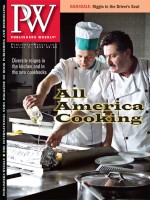Benjamin Percy confides that he never dreamed he'd become a writer—much less receive a Whiting Award in 2008.
"Growing up where I did, it would have been the equivalent of announcing I wanted to be an astronaut," he says, adding that he did grow up in a house filled with books and he was a voracious reader, but of action-packed mysteries, western novels, and archeology magazines. "Indiana Jones was my hero," he says. "I had a bullwhip. I had a fedora."
Percy, 31, spent his youth in Tumalo, Ore., a rural ranching community between Bend and Redmond in the center of the state. It was a childhood of "mucking out horse stalls, chasing jackrabbits with BB guns, and ducking under barbed-wire fences."
It was only at Brown University, while he was dating Lisa (who became his wife) and writing her what he recalls as "all sorts of tawdry letters and poems," that—upon her suggestion—he first contemplated writing as a career. After graduating in 2001, he went on to get an M.F.A. in creative writing from Southern Illinois University.
"If I hadn't met my wife," Percy says, "I'd probably be a lobster man or a bartender." Instead, he's a creative writing professor at Iowa State University with two critically praised collections of short fiction, The Language of Elk (Carnegie Mellon University Press, 2006) and Refresh, Refresh (Graywolf, 2007). His debut novel, The Wilding (Graywolf), follows "suburbanite" Justin Caves; his father, Paul; and his son, Graham, on a camping trip into a remote canyon scheduled for development that becomes a struggle for their very survival. Meanwhile, back in town, Justin's wife faces threats to her own physical and psychological well-being.
PW's starred review compared the novel to James Dickey's Deliverance. While Percy admits to consciously employing themes and plot devices in The Wilding similar to those Dickey used to such effect, he explains that his overall strategy in writing The Wilding was "to approach genre with a literary lens," using lyrical language and metaphors in a tale driven by the twists and turns of its plot and subplots. "What I hope is that The Wilding is a literary thriller," he says. "That's what I set out to do."
It's also a novel with a strong sense of place, introducing colorful characters that could exist only in the Pacific Northwest—an unscrupulous leader of the local Native American community who secretly collaborates with a real estate developer to build on sacred land; a character evocative of the ape-like creature, Sasquatch, that according to legend, inhabits the forests in the region.
"If you're writing a story, you need to incorporate fully the history, geography, culture, the myths of this place," Percy says. He believes setting is a character, as essential to the story line as dialogue.
"Sasquatch is one of those myths I grew up with; he was always there," Percy says of the creature who's played a cameo role in several of his short stories. "There was a Bigfoot museum, a Bigfoot sighting on the news, Bigfoot stories around the campfire, Bigfoot books," and although Percy's only been back to central Oregon three times since his high school graduation in 1997, most of his fiction is set there. He unabashedly calls the region his literary muse, although it's become a place that now exists more in his memory than in reality.
While critical of how Oregon has changed, with its influx of wealthy residents, Percy insists he'll continue to set his fiction in the region he once knew. In the future, though, including in the horror novel he's currently writing (tentatively titled Red Moon), he's decided to set the action in fictional towns rather than actual places. And while he appreciates the stark beauty of the Iowa landscape where he now lives, he doesn't feel the same strong connection to the land that he's always felt toward the West.
"I need mountains, I need rushing rivers. Being close to wilderness is what matters most to me," he says. "That's where I feel most alive. The way the mountains rise up like a jawline, the way turkey vultures are always circling, the way I can come across in a dry canyon the bones of a cow that's been gnawed over by coyotes. That's what haunts me about central Oregon."
"I'm upset about [its] changing face, the vanishing West," Percy admits. His writing addresses that: a "visceral" and "wild" landscape that had already started to recede even while he was still living there.



 Volume 257
Issue 31
08/09/2010
Volume 257
Issue 31
08/09/2010





